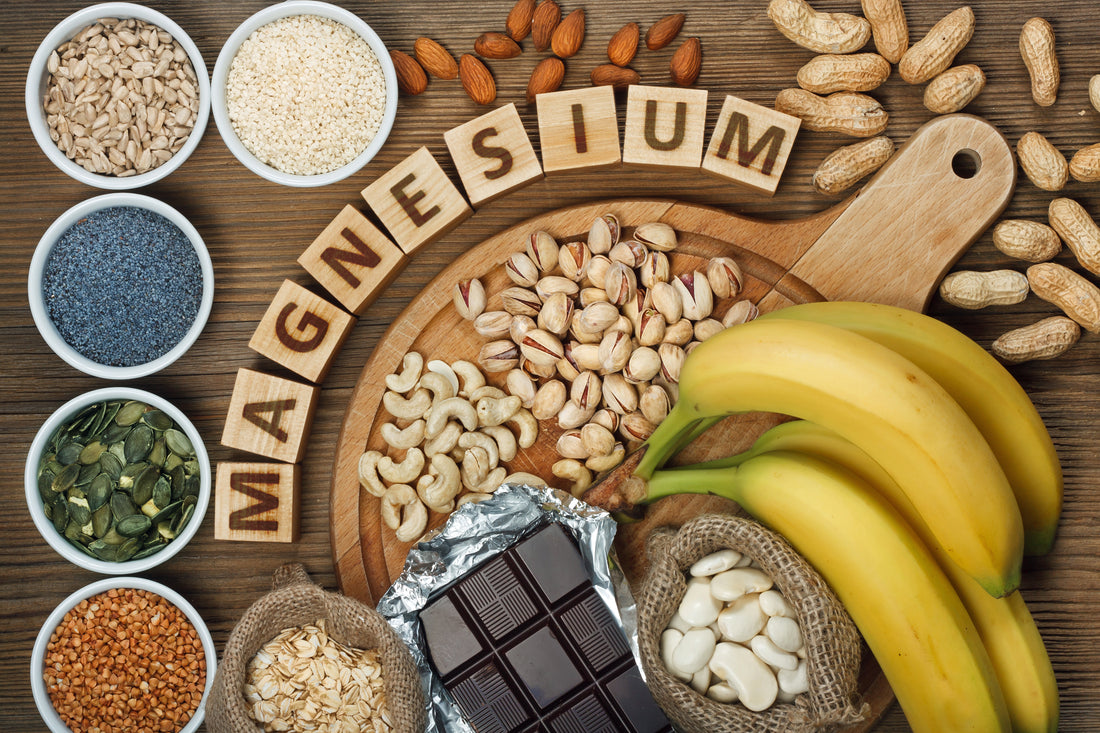Magnesium is an essential mineral and the fourth most abundant in our body. According to the National Institute of Health the average body contains 25 grams of magnesium. Of this, 50 to 60 percent is contained in the bones. The rest is situated in the soft tissue.
Many people are not getting enough magnesium in their diets. Did you know magnesium aids in over 300 metabolic functions in the body?
Adult males between the ages of 19-30 need 400 milligrams of magnesium daily, while females need 310 milligrams. After the age of 30 the amount increases to 420 milligrams for males and 320 for females. Additionally, if you enjoy fitness on a regular basis, extra magnesium is required, as this mineral is excreted during exercise.

Working Out with Magnesium
Magnesium is essential for energy, which helps the body stay active during a workout. This mineral is essential for pushing blood sugar into the muscles. It keeps the muscles pumping. This is mandatory for the body’s most important muscle—the heart.
Additionally, magnesium is responsible for muscle contractions and relaxation. The result is increased endurance and increased performance. This makes muscle enhancing and building exercises from Pilates to weightlifting more effective.
We all know protein helps to contribute to muscular growth and repair. Magnesium aids in the formation of protein in our body. Power up with magnesium!
After a hard workout, the body needs recovery. A good night of sleep is necessary. Did you know magnesium is a natural sleep remedy? You will often find magnesium in a stronger supplement for sleep, mixed in with melatonin. Take it with a light snack, a couple hours before bedtime. It will help the muscles and mind to relax before you drift off. Magnesium works wonders on painful night cramps and restless legs.
Bones and muscles support one another. As muscle size increases, bones must increase too. This same theory works in reverse as well. If the bones did not increase with muscle, the muscle would snap the bones. If the bones grew without the muscles, bones would be too heavy for muscle to lift.
As already mentioned, more than 50 percent of the body’s magnesium is housed in the bones. Calcium is essential for bone growth and health. Calcium is supported by vitamin D. Magnesium assists in the activation of vitamin D. This trio is a powerhouse for building bones and muscles.
Excellent Food Sources of Magnesium
Reach for nuts and seeds. Just two tablespoons of pumpkin seeds contain a whopping 156 milligrams. Chia seeds are also packed with magnesium. Two tablespoons contain 111 milligrams. Similarly, flaxseed has 80 milligrams of magnesium in two tablespoons.
In the nut category there are 160 milligrams of magnesium in a half cup of almonds, and 144 milligrams in a half cup of cashews. Nuts make a quick portable snack. Pack nuts in your gym bag for a quick snack after a workout.
Do you enjoy smoothies for breakfast? Add soy milk to your blender to start your day with a healthy source of magnesium. Soy milk contains 61 milligrams per cup. Add in a medium banana for 32 milligrams of magnesium. A half cup of plain low-fat yogurt contains 42 milligrams.
Beans also contain high concentrations of magnesium. Black beans make the top of the list with 60 milligrams in just one-half cup. Add black beans to soups or salads. Black bean burgers are a healthy vegan alternative to beef.
Black beans are common in Mexican foods that are enjoyed not only in Mexico, but throughout North America, and around the world. In Mexican cuisine black beans are served as a side dish or incorporated into fillings for burritos enchiladas.
Kidney beans are also a healthy source. In just a half cup of kidney beans, there are 35 milligrams of magnesium. Whip up a batch of homemade chili using kidney beans and black beans. Be sure to top it with plain low-fat yogurt just before serving.
When it comes to grains think quinoa. In a half cup of cooked quinoa there is 144 milligrams of magnesium. Quinoa can be served as a side dish for lunch or dinner, but also think about incorporating it into colourful salads. Eat quinoa as an alternative to oatmeal. Add nuts, raisins, cranberries, or other dried fruit.
One cup of cooked spinach contains 156 milligrams magnesium. Kale, collard greens, and mustard greens also contain this powerful mineral.
Fatty fish is always part of a healthy diet. Salmon, mackerel, and halibut all contain magnesium. In a small 3.5 ounce serving of salmon there are 30 milligrams of magnesium.
Magnesium is an essential nutrient for your body. It’s what your muscles and bones need for optimal health.

